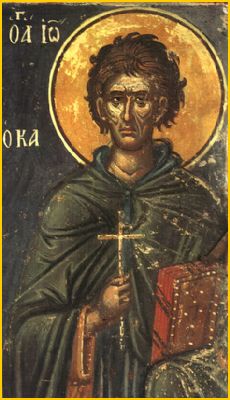|
|||
|---|---|---|---|
| This weekly bulletin insert complements the curriculum published by the Department of Christian Education of the Orthodox Church in America. This and many other Christian Education resources are available at http://dce.oca.org. | |||

Saint John Calabytes, called the Hut-Dweller, was born in the fifth century to a prominent Christian family in Constantinople. John was well-educated, and had the double luxury of access to books and the free time to read them. The books John chose were mostly spiritual ones, and they convinced him that the familiar life of ease and comfort was not for him. He would enter a monastery, he decided, and would take on strict discipline. He asked his parents for a book of the Gospels, wanting to study them more closely as he prepared for the life he intended to undertake. The parents' response reflected their attentive love for their son. It was also a sign of their respect for the Scriptures, and a reflection of their wealth. They had a beautiful book made for their boy, with flowing calligraphy and a gem-studded gold binding. It became his constant companion. In secret, John made his way to a monastery in Bythinia whose monks were known as the "unsleeping" ones because their monastic rule was so demanding and rigorous. But his zeal and effort equaled theirs. He became so pale and gaunt that he no longer resembled the hearty young man who had first joined their ranks. But something nagged at John. He remembered that his parents had shown only love and concern for him, and that he had abandoned them without a word. The elegant Gospel book, which he still kept with him, reminded him every day of their magnanimity. Finally he asked for, and received, the abbot's permission to return to his parents' home. Once again, though, John would carry out his plans in secret. He didn't approach the spacious house, but built a tiny hut near its gates, and lived there with little protection from harsh weather. His parents' servants gave him food to survive on, but with contempt and derision. John was so haggard that they had no idea he was the master's son. Even the master might not have recognized him. Yet that symbol of love, the Gospel book, was about to bring parents and child together again. John, having received a divine vision that he was soon to die, asked a servant to bring his parents to him. Though they were reluctant, they were curious to see what this beggar had to say. Meeting them, John told them who he was, gave them the Gospel book, and asked for their prayers as he promised to pray for them.
The parents were devastated at the thought of losing their son so soon after finding him again, and guilty that he had languished by their very gates. But John assured them that he had chosen his life, and would have wanted no other. A passage from Ephesians gives some comfort to all those who feel alienated or separated: "But now in Christ Jesus you who once were far off have been brought near in the blood of Christ" (2:11). |
|||
